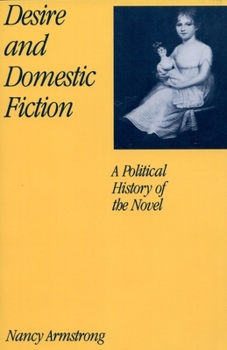Desire and Domestic Fiction: A Political History of the Novel
Select Format
Select Condition 
Book Overview
Desire and Domestic Fiction argues that far from being removed from historical events, novels by writers from Richardson to Woolf were themselves agents of the rise of the middle class. Drawing on texts that range from 18th-century female conduct books and contract theory to modern psychoanalytic case histories and theories of reading, Armstrong shows that the emergence of a particular form of female subjectivity capable of reigning over the household...
Format:Paperback
Language:English
ISBN:0195061608
ISBN13:9780195061604
Release Date:February 1990
Publisher:Oxford University Press
Length:320 Pages
Weight:0.83 lbs.
Dimensions:0.8" x 5.5" x 8.5"
Customer Reviews
1 rating
The Importance of Armstrong's Desire and Domestic Fiction
Published by Thriftbooks.com User , 24 years ago
Nancy Armstrong's influential book, Desire and Domestic Fiction: A Political History of the Novel, connects the rise of the novel with the history of sexuality (ie. gender difference) and the rise of the English middle class. Armstrong's three part explination for the rise of the novel acts as a correction of Isaac Watts' influential triple rise thesis in his study, The Rise of the Novel. Watts connects the rise of the novel to the rise of the middle class, the rise of Puritan values, and the rise of literacy. Armstrong's emphasis clearly differs from Watts insofar as she defines the novel as domestic, women's writing. Armstrong not only redefined Watts' history of the novel, but created a new space in the academic debates about domesticity. By stating the domestic novels were bound up in (indeed antecedent to) the formation of gender difference and the middle class she grants more power to domestic novels than previous ciritics had allowed. Armstrong's analysis of novels (though her writing also has illumunating sections on eighteenth century conduct books and educational theory) begins with Samuel Richardson's Pamela and Jane Austen's Emma, in which she notes the importance of a woman's qualities of mind, as opposed to rank, and how Austen's writing worked to standarize the English language. The study contiues with a history of unions (combinations) in the early ninteenth century, and then moves onto examine the Brontes and how Victorian novels construct the domestic space as one in which women have the power of survelliance, as well as the Vicotrian phenomenon of a character's desiring the one person they are not permitted to obtain (Catherine and Heathcliff in Wuthering Heights). Her study concludes with a discussion of the process and importance of reading itself. I highly reccomend Desire and Domestic Fiction. It is well worth the read, especially for people who care about the history of the novel, redefinitions of the political sphere and a political and cultural history of sexuality and domesticity.





